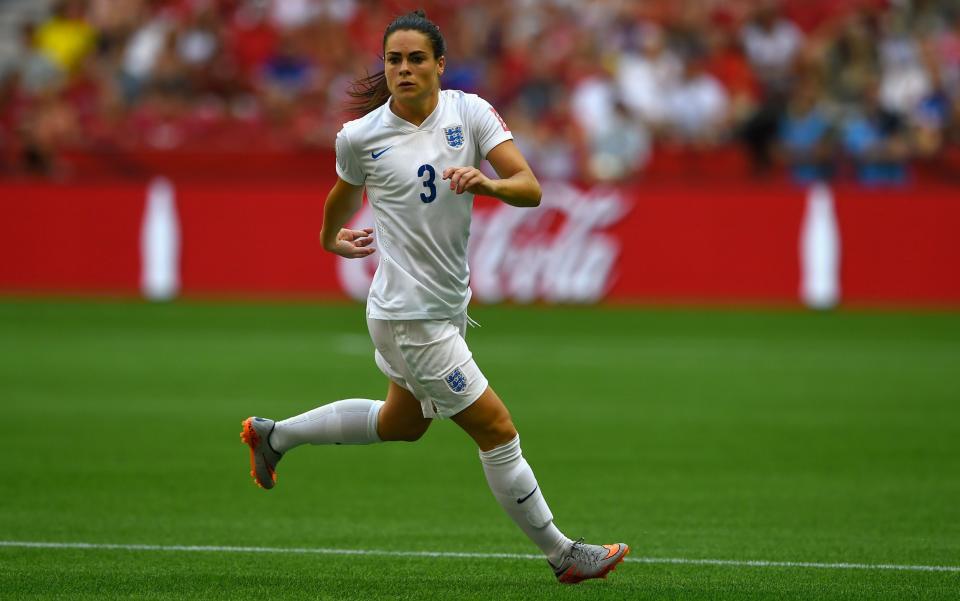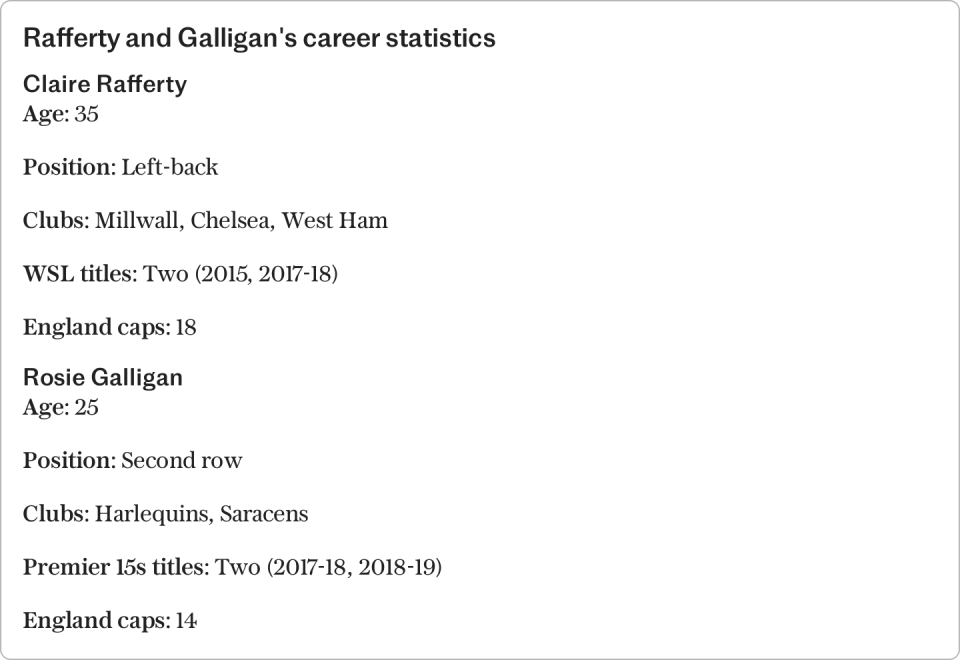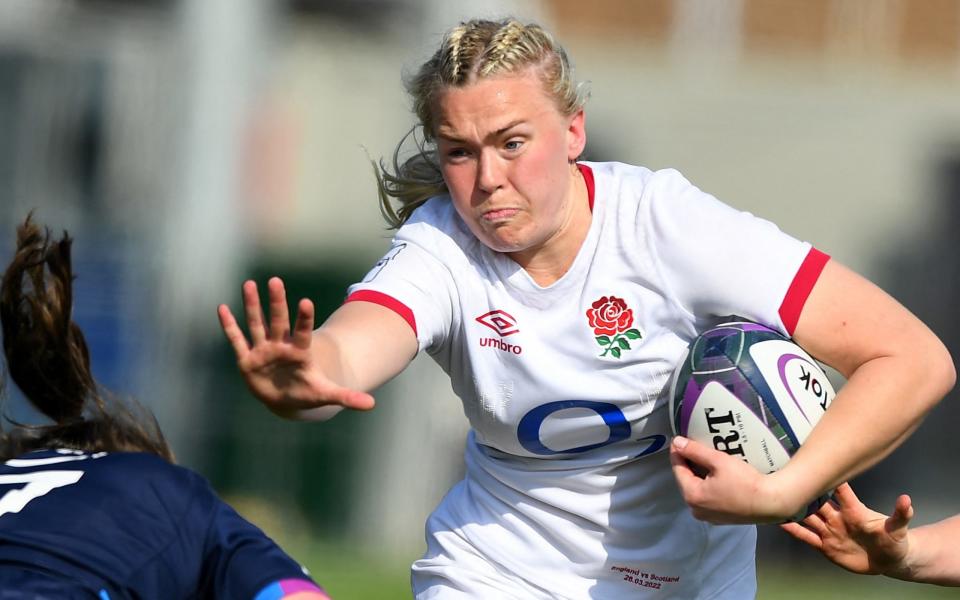Dressed from head to toe in rugby kit, Claire Rafferty bounces into the Sevenoaks RFC clubhouse and drops onto a sofa next to Rosie Galligan.
Rafferty, a former Lioness, and Galligan, a current Red Roses second row, have never met but over the next half hour they strike up a warm conversation that meanders from the blossoming profile of women’s sport to one of rugby’s great debates: whether to fake eyelashes can remain in a maul.
Rafferty, who made more than 100 appearances for Chelsea in the Women’s Super League, made 18 appearances for England and competed for Great Britain at the 2012 London Olympics, has started playing rugby for Galligan’s local club, Sevenoaks.


For anyone who has suffered three anterior cruciate ligament injuries – as Rafferty did during her 15-year career – the rough and tumble nature of rugby may not seem like the most natural choice.
So Telegraph Sport brought the pair together to discuss their respective journeys as elite sportswomen and Rafferty’s unexpected decision to pick up the oval ball.
“I was scared of rugby,” says Rafferty, 35, who retired in 2019. “I didn’t know the rules, I didn’t know anyone. I was afraid I was going to get hurt and I was tired of getting hurt. I was suffering so much from injuries and there was almost… resentment. But the biggest motivation [for starting rugby] was that I wanted to find a new identity, away from football. I’ve reinvented myself a bit. The fear just disappeared.”
Rugby was always on Rafferty’s radar. The Sevenoaks resident had started watching internationals on television and joined the Kent club, which produced England’s Ben Earl, after a friend recommended she try it.
Galligan’s curiosity piques. “When you came to your first training session, you said something, like, did people know who you were?” she asks.
“I didn’t say anything,” Rafferty grins. “But the girls said, ‘Are those football boots you’re wearing?’ Even learning how to kick the ball and adapt to its shape was completely different. The pressure returned. I was a football player. I thought, ‘People expect me to kick a rugby ball!’”
Pressure is a feature of both women’s lives. Rafferty only turned professional at age 25 – the same age Galligan is now – after working part-time as a financial analyst for Deutsche Bank. She came through the ranks in England at a time when women’s football had a fraction of the resources, investment and off-field support it has today. Rafferty became a victim of the flawed system she found herself in.


Conforming to stereotypes
When she started the England playing journey at the age of 15, she was subjected to regular weigh-ins, which led to a battle with an eating disorder. “In terms of the training environment and being weighed, there are expectations about what your body weight should be, even though everyone has different sizes and different genetics, you are made to fit a certain body type, to have a certain body fat” , says Rafferty. “Then you have the pressure from the media.”
As a sportswoman with a rising profile, Galligan, who signed a professional contract with the Rugby Football Union after playing in the 2022 World Cup, can identify with the pressure of having to conform to feminine stereotypes. “In my younger years I always wore full make-up for rugby,” she says. “One day I thought, ‘Why am I doing this? I don’t wear makeup during the week, so why do I put on bronzer, highlighter, eyeliner, waterproof mascara and lip gloss on Saturdays?”
That’s before taking into account the precarious financial situation of today’s female athletes. Only recently have match fees and bonuses been included in Red Roses contracts, while most contracts in rugby – and women’s football – do not last longer than a year.


“Men’s soccer players have money so they would be fine when they retired,” Galligan says. “My dad said to me recently – because we have a contract extension – ‘What if you don’t get an extension?’
“I just got a mortgage, my livelihood would change completely. I worked as a marketing manager for a few years so I had something to fall back on and hopefully come back to, but for some girls who have had contracts since 17, 18… your rugby career can end at any time. It’s quite a precarious way of life.”
‘I wish I had played rugby as a child’
A former professional, Rafferty has rediscovered the unbridled joy of grassroots sport as a fullback at Sevenoaks, one of the latest rugby clubs in the country to launch a women’s team. More than 130 women’s teams have been established since 2017, with the number of female players increasing from 25,000 to 40,000 in five years. The RFU hopes this number will increase to 100,000 by 2027.
“I wish I had played rugby as a kid,” Rafferty reflects. “The environment is so much more open. I don’t know if I say that because I’ve had a high-pressure career. But in rugby there is a whole level of respect that you don’t get in football. I remember accidentally swearing at the referee during training and immediately feeling bad. That is the norm in football.”
Galligan laughs before telling her own horror story at a recent football game, when she was surrounded by fans shouting obscenities. Rafferty steers the conversation to a more spicy topic.
‘Women’s rugby should be on TV more’
“I don’t think there are enough women on TV,” she says matter-of-factly. “It should definitely be on TV more. That is clearly what has changed in women’s football. I think there needs to be more investment in rugby in that area.”
The Women’s Six Nations have found a home on the BBC, but the overall broadcast offering for international women’s rugby remains vague. Last year’s WXV English campaign was not shown on a main channel. The team’s two warm-up games were relegated to a livestream but still attracted nearly 250,000 online views.
It’s a world away from football’s WSL. Chelsea’s 5-1 win over Liverpool last November had a record average crowd for the competition, peaking at 955,000.
“We are all on such different trajectories of where elite women’s sport is,” Galligan reflects. “The European Championship for women has certainly paved the way for this. The Lionesses have changed that legacy for the younger generation and that is something rugby must take into account in the years to come.”
Finally, what advice would she give to rugby newcomer Rafferty? “Play with a smile on your face,” she says. “Life is so serious, especially when you have played a top sport and know the pressure there. Embrace it, put your head where it hurts.”
She pauses for a moment before giving one last tip. “Lose some eyelashes,” she says, as the couple bursts into laughter.